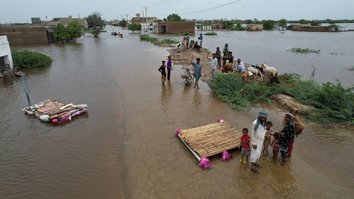The recent re-approval of a 300-megawatt power project based on imported coal in Gwadar port city of Balochistan has raised debate not only about China's 2021 pledge not to build any new coal power plants overseas but also its implications for the Pakistan's economy and environment.
Pakistan is currently negotiating with Chinese state-owned entities under the China-Pakistan Economic Corridor (CPEC), a Pakistani component of China's Belt and Road Initiative (BRI), also known as One Belt One Road (OBOR), about the coal-power project in Gwadar.
Officials want financing for the project to be completed by the end of the year so construction can begin as soon as possible, Shah Jahan Mirza, head of government-owned Private Power and Infrastructure Board, told The Third Pole in an article published March 16.
China -- by far the world's biggest polluter and biggest consumer of coal -- pledged at a United Nations meeting in September 2021 to end overseas coal projects as part of its contribution to the global effort to cut climate-warming greenhouse gas emissions.
But on the ground, China has been ramping up coal production in a desperate attempt to meet its energy needs and increase its influence in developing countries, including Pakistan.
China Communications Construction Co. (CCCC), a majority Chinese state-owned entity, is executing the project, which has an estimated cost of $542.32 million, according to the CPEC website.
CCCC is one of the 24 Chinese state-owned companies blacklisted by the United States in August 2020.
The project was conceived and approved under the CPEC in 2016, but its formal construction had not started.
After then-prime minister Imran Khan announced a moratorium on coal-based power generation in December 2020, observers expected the project to be shelved since it had not found financing.
However, the discussion on building the Gwadar power plant began again last July when the current government, pressed by its economic woes and a rising import bill, decided to supply the project with alternative fuel.
The Chinese government forced Pakistan to reverse its policy objectives and shift the plant back to imported coal, officials said.
Economic burden
Running the Gwadar power plant on imported coal will further worsen Pakistan's economic crisis, economists and officials said.
China has already built and financed coal power plants in Pakistan, which according to analysts, have become an economic burden for Islamabad and one of the major reasons for its dire economic situation.
Pakistan in recent months has been facing a severe energy shortage during an economic crisis fueled by inflation. To make matters worse, coal prices have hit record highs due to civil unrest in South Africa and Russia's invasion of Ukraine.
With a lack of foreign reserves, Islamabad has already been seeking cheap coal for its Chinese-built plants.
"It is now hard for Pakistan to buy expensive coal ... to overcome the worsening electricity crisis in the country," said a Pakistani Ministry of Finance official on the condition of anonymity.
Unpredictable international coal prices make running Chinese-financed coal-fired projects to generate electricity "impossible", the official said.
Chinese power-producing firms in Pakistan threatened to shut down their plants last May unless the government made 300 billion PKR ($1.1 billion) in back payments, Dawn reported May 10.
The Chinese companies said they were not provided the liquidity needed to match coal prices.
Environmental, security implications
Taking the case study of the Port Qasim Power Plant near Karachi, a group of researchers affiliated with Boston University (BU)'s Global Development Policy Centre found that Chinese-financed power plants in Pakistan may also encroach on vulnerable environmental areas.
Port Qasim Power Project, one of the several Chinese-built coal power plants, has been posing "significant health risks for the surrounding community due to their proximity to the power plant, with an additional 49 deaths estimated to occur annually in the study population", BU said in November 2021.
The exponential growth of Chinese influence in Pakistan, particularly in Balochistan -- with Chinese companies exploiting local resources without care or concern for the impact on locals -- has led to serious unrest in the province.
Pakistani authorities, at the behest of Beijing according to locals, in December cracked down hard on a protest movement in Gwadar.
The protesters were seeking an end to illegal deep-sea fishing by local and Chinese trawlers and to the harassment of locals at security checkpoints leading to Gwadar port, which remains a crucial part of CPEC.
"Instead of making Gwadar a hub of business and trade and [creating] development projects for the residents, China has been forcing Pakistani authorities to make the port city a security zone and to limit residents' movements," Ashraf Ali, a student in Gwadar, told Pakistan Forward in 2021.

![A file photo of Gwadar in 2022. Pakistan has plans to build a coal power plant there after securing financing from Chinese state-owned entities. [Zarak Khan]](/cnmi_pf/images/2023/03/29/41387-pakcoal-585_329.jpg)






